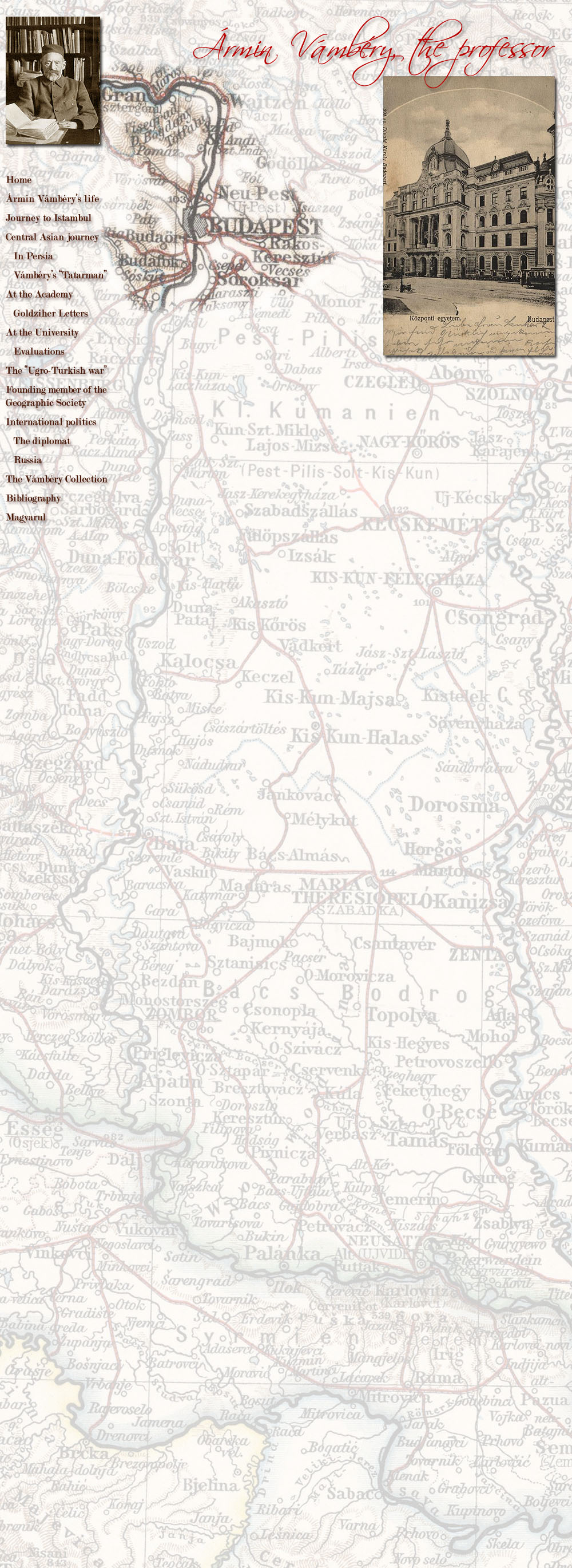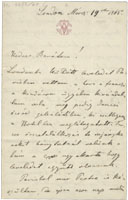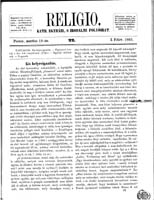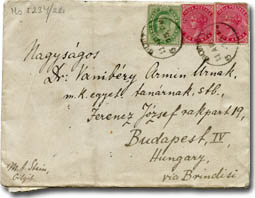
 Learning
and teaching accompanied Vámbéry’s whole career. He was almost a child when his
fate first forced him to earn his living as a private tutor and language
teacher, and he also taught during his stay in Istanbul.
Learning
and teaching accompanied Vámbéry’s whole career. He was almost a child when his
fate first forced him to earn his living as a private tutor and language
teacher, and he also taught during his stay in Istanbul.
After his Central Asian journey he spent a longer time in England, where he was
welcomed, was invited for a reading tour, and his travelogue was a great
success. However, the hoped-for financial gain failed to realize, and for this
he blamed his publisher,
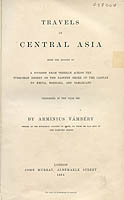 John Murray. The obtained amount was not sufficient either to continue living
there, or to the foundation of a home in Hungary. At that time, as he wrote in
his memoirs: “in my desperate situation I clung to the straw of the
professorship in Pest, and I considered the cathedra of Oriental languages the
lifeboat on the always stormy sea of my life.”
1
John Murray. The obtained amount was not sufficient either to continue living
there, or to the foundation of a home in Hungary. At that time, as he wrote in
his memoirs: “in my desperate situation I clung to the straw of the
professorship in Pest, and I considered the cathedra of Oriental languages the
lifeboat on the always stormy sea of my life.”
1
His way to the university, however, was not smooth. At the time one had to turn
to the ruler with such a request, and “…in order to gain the professorship, I
had to travel to an imperial audience to Vienna. His Majesty kindly received me,
he inquired about the details of my journey, and immediately fulfilled my
request, noting that I have suffered many vicissitudes, and I have inded merited
this position. He had one single objection, namely that even in Vienna there are
few who decide to learn Oriental languages, and in Hungary probably even less
students will enroll. To my comment, that “If I will have no students, I myself
will learn”, he smiled, and released me from the audience.”
2
Vámbéry explained the cool reception with his conversion to Protestantism, after
which the Catholic university denied to him a teacher’s position, so that he
could only work as a lector publicus, in a modestly prized position
originally created for János Repiczky for the teaching of Oriental languages,
which was vacant since his death in 1855. He shared his feelings, hopes and
disappointments concerning his position in sincere letters with his friend, the Turcolgist and Protestant pastor Áron Szilády.
He taught at the University of Pest from
1865 until 1905. In 1868 he was appointed a lecturer in public, and in 1870 he
won the title of regular lecturer in public. When he retired at his own request,
the university almanac listed for long his titles, awards and memberships in
scientific societies:
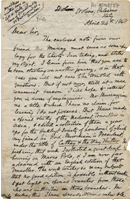 “Ármin Vámbéry,
honorary doctor of the University of Budapest and the Trinity College of Dublin,
ordinary and public lecturer of Oriental languages and literatures, Kight of the
Order of Leopold, ordinary member of the Hungarian Academy of Studies,
corresponding member of the German and London Oriental Societies, honorary
member of the Geographic Societies of Berlin, Frankfurt, Amsterdam, Dresden,
London, Paris, Rome, Basel and Vienna and of the Société Philologique of Paris,
corresponding member of the British Association for Advancement of Sciences and
the Orientalisches Museum of Vienna, Hungarian secretary of the Anthropological
Society of London, owner of the great ribbon of the Turkish Medsidie Order,
commandeur of the Italian St. Moritz and Lazar and the English Victoria Orders,
owner of the Mexican “Notre-Damee da Quadelupe”, the officer’s grade of the
Persian Shir u Khurshid, and of His Royal and Imperial Majesty’s golden medal
for arts and sciences, and of the Italian Order of Crown.”
4
“Ármin Vámbéry,
honorary doctor of the University of Budapest and the Trinity College of Dublin,
ordinary and public lecturer of Oriental languages and literatures, Kight of the
Order of Leopold, ordinary member of the Hungarian Academy of Studies,
corresponding member of the German and London Oriental Societies, honorary
member of the Geographic Societies of Berlin, Frankfurt, Amsterdam, Dresden,
London, Paris, Rome, Basel and Vienna and of the Société Philologique of Paris,
corresponding member of the British Association for Advancement of Sciences and
the Orientalisches Museum of Vienna, Hungarian secretary of the Anthropological
Society of London, owner of the great ribbon of the Turkish Medsidie Order,
commandeur of the Italian St. Moritz and Lazar and the English Victoria Orders,
owner of the Mexican “Notre-Damee da Quadelupe”, the officer’s grade of the
Persian Shir u Khurshid, and of His Royal and Imperial Majesty’s golden medal
for arts and sciences, and of the Italian Order of Crown.”
4
As the university archives preserve the academic curricula only from the 1877-78
academic year on, we cannot reconstruct the first decade of his working. On the
basis of the surviving documents we can say that he held mainly language lessons
(beginning and advanced level) and text readings in Ottoman Turkish, Turco-Tatar
and Persian. The texts studied together included the Pechevi’s historical work,
the Shahnameh, Anvari Soheili, Gulistan, Jusuf u Zuleihkha, as
well as Azeri and Chagatai texts.
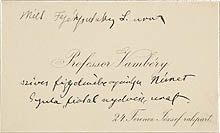 In the 90s his former students Ignác Kúnos and
Sándor Kégl took over a part of
his lessons, and from the academic year of 1903-1904 only they taught at the
university, Vámbéry held his lessons in his apartment.
In the 90s his former students Ignác Kúnos and
Sándor Kégl took over a part of
his lessons, and from the academic year of 1903-1904 only they taught at the
university, Vámbéry held his lessons in his apartment.
He probably had very few steadfast students, as is shown by the fact that he had
to announce many beginning courses which not always continued as advanced ones.
Nevertheless one of his first students, Ignác Goldziher recalls in his academic
commemorative speech, how great impact his enthusiastic encouragement had on his
students, which focused much more on the practice than on theoretical
disquisition. “Surely, his lectures did not contain too much comparative
linguistic (or only some occasional Turco-Hungarian parallels), historical
linguistics and phonetics – he did not hold us back from these, but he hinted
that we must sought for these later and from other sources –,
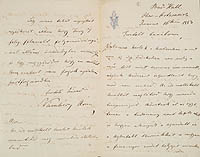 but the stronger
he qualified us to penetrate into the depth of the ideas of the respective
people through the language and literature. Through his stimulus and clever
didactics we soon arrived at the point where, beyond the elements of the
grammar, we could deal with a masterpiece of Turkish and Persian literature.”
5
but the stronger
he qualified us to penetrate into the depth of the ideas of the respective
people through the language and literature. Through his stimulus and clever
didactics we soon arrived at the point where, beyond the elements of the
grammar, we could deal with a masterpiece of Turkish and Persian literature.”
5
The importance of
Vámbéry’ university activity is shown by the fact that Oriental studies became
part of the Hungarian higher education by way of him, and he played a
groundbreaking role in the establishment of the teaching of Turcology.
